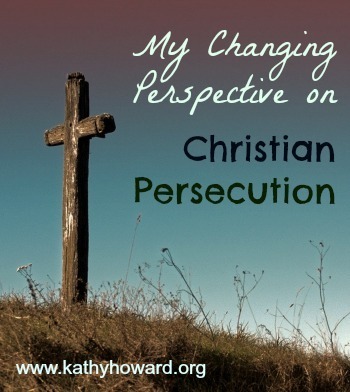Kathy Howard's Blog: Unshakeable Faith for Life, page 65
October 2, 2014
Creation Sings God’s Glory

My husband and I recently returned from a week on the island of St John in the US Virgin Islands with some dear friends. Our two families have vacationed together five or six times over the last twenty years. But last week, just the four of us finally got to spend some relaxing time together.
I was the early riser in the bunch. Each morning I had the wonderful luxury of sitting on the deck with my Bible, study material, and a cup of coffee. I read God’s Word and looked out at the ocean. It was marvelous!

The study book under my Bible is Beth Moore’s “Children of the Day,” which I’m studying with the ladies of my church.
One morning I was reading from “Embraced by Holiness” - I’m currently leading this study with our small group at church. As a storm quickly passed by in front of me, I read these words from Week Two, Day One, about how God reveals His holiness through creation:
Before the stars dotted the heavens and the waves crashed on the shore, God existed in all His holiness. Divine, perfect nature with only the Triune God as witness. Then He spoke, and His majesty burst forth in visible wonder. He splashed His glory across the skies and spread His power in the ocean depths.
Now all creation lifts a clear, unbroken chorus of praise to its Creator. Since the beginning of time, what has been made testifies to the unlimited power and worthiness of its Maker. Nature beckons us to seek God, bidding us turn our eyes and hearts to the Creator. It is beyond comprehension that this powerful, majestic, holy God desires us to know Him. And yet He does.
Creation summons us to know and worship the Creator. The storm did indeed remind me of the power and glory of God. It was Psalm 19 lived out before my eyes:
The heavens declare the glory of God; the skies proclaim the work of His hands. Day after day they pour forth speech; night after night they display knowledge. There is no speech or language where their voice is not heard. Psalm 19:1-3, NIV
Coincidence? Hardly. God used the storm to reinforce this lesson in my heart and mind. But, He didn’t stop there. He continued to press the lesson, to make His glory known to me that morning. As I read Psalm 19 and watched the end of the storm, a rainbow begin to form. As it brightened, splashing its spectrum of color across the sky, a second bow joined it! Oh, how I wish my phone photo could do justice to the actual sight.

This phone pic does not show it well, but if you look to the left of the bright rainbow you can see a hint of the second!
I was torn between standing and watching and running to wake everyone in the house. In the end, I spent a few moments praising God for His power and glory and then shooting up the stairs to drag my husband to a window. What a glorious morning!
Have you heard Creation’s songs of praise? What are some things in nature that quickly draw your thoughts to the Creator and foster praise?
The post Creation Sings God’s Glory appeared first on Kathy Howard.
September 29, 2014
7 Signs She Might Make a Great Small Group Leader
 The fall semester of women’s Bible study is now in full swing. You managed to round up enough leaders, but you certainly didn’t have many – if any – extras! And before you know it, January will be here and it will be time to secure small group leaders all over again!
The fall semester of women’s Bible study is now in full swing. You managed to round up enough leaders, but you certainly didn’t have many – if any – extras! And before you know it, January will be here and it will be time to secure small group leaders all over again!
Does the thought of recruiting a few new small group leaders cause you to sigh heavily? Maybe you have no idea where they’ll come from. Maybe you even secretly hope you won’t have as many ladies sign-up for Bible study.
Hang on just a minute! Don’t panic! If you have groups of women studying the Bible together, then you have groups of potential leaders. You just need to know how to spot the best candidates.
You can provide training in some areas like guiding discussion and dealing with different personalities. But other qualities cannot be so easily taught.
Look for these seven signs in potential new leaders. Although not a sure thing, they are strong indicators that you could have a great leader in the making!
She cares about and actively serves other women (Romans 12:9-13).
She is passionate about God’s Word and is committed to its study (2 Timothy 3:14-17).
She takes discipleship seriously and is growing spiritually (1 Timothy 4:7-8).
She is a woman of strong character with a good attitude and integrity of speech (Titus 2:7-8).
She demonstrates faithfulness and reliability in her current commitments (Proverb 31:27).
She is humble and teachable (James 3:13).
She is a woman of prayer (1 Thessalonians 5:16-18).
What other characteristics do you look for in a potential leader? What qualities can be taught and which cannot?
The post 7 Signs She Might Make a Great Small Group Leader appeared first on Kathy Howard.
September 25, 2014
10 Things to Pray for Christians in Iraq
 This past week, stories of persecuted believers filled social media. As I read still another tragic account, the need to pray overwhelmed me. Yet, I felt so inadequate about how and what to pray for Christians in Iraq.
This past week, stories of persecuted believers filled social media. As I read still another tragic account, the need to pray overwhelmed me. Yet, I felt so inadequate about how and what to pray for Christians in Iraq.
Recently, God has been shifting my perspective on Christian persecution. I know from His Word that He works in it and through it in a unique way and uses it to expand the Kingdom. Prayers solely for the persecution to end did not seem adequate.
So I asked God to show me. “Lord, how do I pray for your people enduring great suffering for the name of Christ?”
Then the Holy Spirit prompted me to look up passages in God’s Word about sharing in the sufferings of Christ. For that is what our brothers and sisters in Iraq and Syria and other parts of the globe are doing.
These passages give us some direction, some catalyst for our prayers. The following are 10 things I pulled right out of Scripture we can pray for these dear, suffering believers:
That they would experience the overflowing comfort of Christ through the very real and abundant presence of the Holy Spirit (2 Corinthians 1:3-5).
For their lives to produce patient endurance (2 Corinthians 1:6-8).
That they would learn to rely totally on God (2 Corinthians 1:9)
That God would help them maintain an eternal perspective, keeping Christ above all earthly things (Philippians 3:7-9).
That they would know Christ deeply and intimately (Philippians 3:10).
That Christ’s resurrection power would flood their lives (Philippians 3:10).
That their suffering for Christ would be a clear, strong testimony to Christ, bringing Him glory (1 Peter 3:15-16).
That they would experience overwhelming join as they participate in the sufferings of Christ (1 Peter 4:12-14).
That their hearts would swell with praise for God (1 Peter 4:16).
For their ultimate deliverance and glory in Christ (Romans 8:17-18).
Join me in praying for believers around the world who are being persecuted because of Christ!
How have you been led to pray? Voice a prayer in the comments below.
The post 10 Things to Pray for Christians in Iraq appeared first on Kathy Howard.
September 22, 2014
Will You Take a Stand for Jesus?
It’s happening more and more every day in our country. Civil rights groups, atheists, and others gain ground in their fight to keep faith and its free expression out of the public eye. But their mission to “protect the rights” of all citizens is essentially an effort to silence many who follow Christ. Sometimes believers fearfully yield to the pressure. And sometimes we don’t. Sometimes we take a stand for Jesus.
Recently, one high school cheerleader took a stand, spoke out loud, and stood her ground for her faith.
 Oneida High School in Oneida, Tennessee has been opening their Friday night football games with prayer over the PA system since 1930. But that changed this month. The local School District – like many other public institutions in America – had received complaints from the ACLU and the Freedom from Religion Foundation. So they made the decision to replace the official opening prayer with a moment of silence.
Oneida High School in Oneida, Tennessee has been opening their Friday night football games with prayer over the PA system since 1930. But that changed this month. The local School District – like many other public institutions in America – had received complaints from the ACLU and the Freedom from Religion Foundation. So they made the decision to replace the official opening prayer with a moment of silence.
That decision created a gap once filled by more than 80 decades of prayer. But the Oneida High cheerleaders, led by Asia Canada, chose to live their faith out loud and step into that gap.
In the first beats of silence, the girls began:
“Our Father, which art in heaven, hallowed be Thy name.”
Immediately, the cheerleaders from the opposing team joined in.
“Thy Kingdom come, thy will be done in earth, as it is in heaven.”
Then the players and the coaches also lifted their voices.
“Give us this day our daily bread. And forgive us our debts as we forgive our debtors.”
The fans in the stands did not want to be left out, so they too joined in.
“And lead us not into temptation, but deliver us from evil.”
Not one lone voice came through the speakers, but instead a whole stadium of people prayed.
“For Thine is the Kingdom and the power, and the glory, forever. Amen.”
A teenage girl encouraged a small group, then that group inspired a crowd. Who might you encourage, who could you inspire, by stepping into the gap, by standing your ground in the fight?
In what ways have you felt pressure from our society to keep quiet about Jesus or hide the expression of your faith? How can you take a stand and in the process encourage others?
The post Will You Take a Stand for Jesus? appeared first on Kathy Howard.
September 18, 2014
The 5 M Strategy for Leadership Development
 Women’s Bible study is a vital component of many church’s women’s ministries. There’s something special about women gathering together to study God’s Word. The unique blend of friendship, encouragement, and accountability creates a perfect environment for spiritual growth.
Women’s Bible study is a vital component of many church’s women’s ministries. There’s something special about women gathering together to study God’s Word. The unique blend of friendship, encouragement, and accountability creates a perfect environment for spiritual growth.
Of course to keep our Bible study ministries running effectively we need leaders – women and men who are not only willing, but also equipped to lead small groups. Unfortunately, many churches struggle to find enough willing and equipped leaders.
Do you see your church in any of the following scenarios?
More than 100 women have signed up for Bible study. Awesome! But, just four women are willing and equipped to lead small groups. Well, that’s enough for about half…
You have enough leaders – barely – for the amount of women you have coming to Bible study. Okay. But, these leaders are tired and overworked. They’d love to simply be a participant one semester. But, without them…
You have a solid number of equipped, faithful leaders for your women’s Bible study. But they’ve been leading for years. There aren’t any young, fresh faces in the bunch. When the current leaders are gone…
For many churches, leadership can be one of the greatest challenges of women’s ministry. Often, we lack enough trained, faithful small group leaders. And even if we have enough leaders now, we should be planning for the future by equipping women from the younger generation.
Your women’s ministry can have strong leadership now and in the future through purposeful leadership development. The 5 M strategy, which I have used to recruit and train small group leaders, could also be used with other types of leadership positions.
Model – Current leaders model leadership in their groups. Include your current small group leaders in your plan for leadership development. Train them well so they demonstrate strong leadership qualities. These kind of solid role models will foster a desire to lead in others. (See “7 Characteristics of Effective Leaders.”)
Mentor – Current leaders identify and mentor potential new leaders. Ask your current leaders to prayerfully watch for potential future leaders within their groups and initiate a mentor relationship with one or two women who are willing. Then the mentees can assist the mentor in leading for a period of time. (Download the list, “7 Signs She Might Make a Great Small Group Leader.”)
Monitor – Leadership responsibilities reverse. Now the mentee leads the group while the mentor supervises and assists.
Motivate – Release the group. The new leader assumes full leadership of the group. The mentor encourages from the sideline and is available for help and to answer questions.
Multiply – The new leaders become mentors. Begin the process again with your new leaders.
This strategy can take much of the anxiety out of your Bible study program. Just think, no more scrambling for leaders or begging your friends to take a group. Instead, with ongoing leadership development that continuously enlists, equips, and encourages new leaders, you are always ready to go!
Have you ever used or been a part of a similar strategy? How did God use it to meet the leadership need?
The post The 5 M Strategy for Leadership Development appeared first on Kathy Howard.
September 15, 2014
The Gospel – Judgment or Saving Truth?
 Have you ever been called “intolerant” or “judgmental?” Or maybe you’ve heard something like: “Well, Jesus may be great for you, but…” or “There are many ways to God…” If you regularly share the Gospel of Jesus Christ, chances are you’ve been called this and more. It seems our culture tolerates everything but God’s truth and those who proclaim it.
Have you ever been called “intolerant” or “judgmental?” Or maybe you’ve heard something like: “Well, Jesus may be great for you, but…” or “There are many ways to God…” If you regularly share the Gospel of Jesus Christ, chances are you’ve been called this and more. It seems our culture tolerates everything but God’s truth and those who proclaim it.
Last week, while reading in the book of John, something Jesus said struck me and I believe it applies to us today as we seek to share the Gospel of Jesus with others:
Jesus shouted to the crowds, “If you trust me, you are really trusting God who sent me. For when you see me, you are seeing the one who sent me. I have come as a light to shine in this dark world, so that all who put their trust in me will no longer remain in the darkness. If anyone hears me and doesn’t obey me, I am not his judge – for I have come to save the world and not to judge it. But all who reject me and my message will be judged at the day of judgment by the truth I have spoken. I don’t speak on my own authority. The Father who sent me gave me His own instructions as to what I should say. And I know His instructions lead to eternal life; so I say whatever the Father tells me to say!” John 12:44-50, NLT
Can Christians – should Christians – tell others that Jesus is the only way of salvation, the only way to the only God?
Several truths found in this passage apply directly to this question:
Jesus and the Father are eternally one and we cannot separate them.
The Father – the one true God who makes up the rules – sent Jesus as the way of salvation.
Anyone who rejects Jesus will be judged by this truth on the day of judgment.
We have been given the message of eternal life. That message is that we all stand condemned already because of our sin, but forgiveness and eternal life is offered through Jesus Christ and Him alone. When we share that Jesus is the only way to God, we are not being narrow-minded or condemning others. We are merely sharing the truth that God established because we want them to receive eternal life. Sharing Jesus is an offer of life!
Jesus answered, “I am the way and the truth and the life. No one comes to the Father except through me.” John 14:6
If we truly, truly believe Jesus’ bold declaration than how can we keep it to ourselves? The eternal destination of our friends, family, neighbors, and co-workers depend on their relationship with Jesus Christ.
How are we doing? How can we share this message of truth today?
The post The Gospel – Judgment or Saving Truth? appeared first on Kathy Howard.
September 11, 2014
My Changing Perspective on Christian Persecution

Recently, I’ve been thinking a lot about Christian persecution around the globe. It’s hard to ignore while Isis and other Islamic extremists slaughter believers in Iraq and Syria. And, of course, today marks the 13th anniversary of the terrorist attacks on the Pentagon and the World Trade Center. And while 911 was not specifically Christian persecution, the fact that the United States was founded on Christian principles certainly adds fuel to the fire.
Why does God allow His people to be ridiculed, discriminated against, beaten, and even killed because they follow Jesus?
 Shouldn’t we pray that all believers have the same freedom to worship Christ that we enjoy here in America? Shouldn’t we beg God to deliver them from their persecutors? Shouldn’t we pray that all persecution come to an end?
Shouldn’t we pray that all believers have the same freedom to worship Christ that we enjoy here in America? Shouldn’t we beg God to deliver them from their persecutors? Shouldn’t we pray that all persecution come to an end?
A few years ago that’s exactly how I prayed. But God has been shifting my perspective on the persecution of believers, how He uses it, and how it fits into His overall purposes.
Before we go any further, let me clarify something. I don’t mean to say – nor do I believe – that God causes or brings the persecution. But somehow, in His mysterious economy, God has chosen to use the persecution of believers to further His Kingdom.
First, let’s see what Jesus said about this topic:
The “world” will hate believers because believers belong to Jesus (John 15:18-19; Matthew 10:22) – This isn’t just a feeling or the experience of some. It’s fact. Jesus Himself said this is the way it would be.
The “world” will persecute believers because we follow Jesus (John 15:20; Matthew 10:17) – Jesus does not call us to persecution. He calls us to “go into the world and make disciples.” He simply made it clear that if we obey Him, we will be persecuted.
The “world” will persecute believers because our righteousness in Christ reveals their sin (John 7:7 and John 15:22-24) – Holy lives reveal the righteousness of Christ and thereby expose the sin of the world. When Christians take a stand for Christ and firmly follow biblical principles, the world will respond with persecution.
God uses persecution for His purposes – God never wastes the suffering of one of His children. It is an opportunity to testify to Jesus, to bring glory to God, to advance the Kingdom (Matthew 10:18-20).
Persecution for the name of Christ is a reason to rejoice – Sounds completely illogical doesn’t it? Yet Jesus said we should rejoice when we are persecuted. That a reward waits for the persecuted in heaven (Matthew 5:11-12).
We should not intentionally seek persecution – This last point is important. We should not allow the possibility of persecution to keep us from witnessing or fully obeying Jesus. However, we also should not purposefully or foolishly encourage it. Jesus told His disciples to “flee to another” place when they are persecuted in one (Matthew 10:21-23).
The only way to stop persecution is to stop sharing the news about Jesus.
Last spring a friend recommended I read The Insanity of God by Nik Ripkin. Ripkin interviewed hundreds of persecuted believers in dozens of countries around the world. He shares many of their stories, including God’s faithfulness and miraculous activity in the midst of their terrible persecution. He relates how God used their suffering to bring glory to Himself and expand the Gospel of Jesus. And how suffering believers prayed for their persecutors to come to know Jesus (see Matthew 5:44).
by Nik Ripkin. Ripkin interviewed hundreds of persecuted believers in dozens of countries around the world. He shares many of their stories, including God’s faithfulness and miraculous activity in the midst of their terrible persecution. He relates how God used their suffering to bring glory to Himself and expand the Gospel of Jesus. And how suffering believers prayed for their persecutors to come to know Jesus (see Matthew 5:44).
God had already begun to shift my perspective on Christian persecution, but reading The Insanity of Godcompletely busted the old paradigm. I dare to say you cannot read this book and remain the same.
In Ripkin’s second book, The Insanity of Obedience he takes the stories and outcomes he shared in the first book and boils it down to some practical principles on Christian persecution and suffering we can get our faith around. Using Joseph’s imprisonment in Genesis as an example, he asks this shattering question: “Is it possible that God has purposes that are tied to the suffering of His people?”
he takes the stories and outcomes he shared in the first book and boils it down to some practical principles on Christian persecution and suffering we can get our faith around. Using Joseph’s imprisonment in Genesis as an example, he asks this shattering question: “Is it possible that God has purposes that are tied to the suffering of His people?”
Considering what Jesus said about persecution we laid out above, I think I would be forced to answer “yes.” Even though it’s shocking. Even though I’d rather it not be true.
Here are a couple more quotes from the Insanity of Obedience that hit me between the eyes:
“Judging by what eventually happened to Jesus Himself, we come to understand that persecution and suffering and sacrifice are necessary parts of His ultimate strategy, even today” (page 5).
“Through our pilgrimage, we have been challenged biblically to believe that God can use even unspeakable pain for His purposes. And we are able now to say with confidence that God uses persecution and suffering for His purposes. Exactly why God uses persecution and suffering is a holy mystery, but the fact that He does use persecution and suffering is a certainty!” (page 12)
I could share many more passages and examples from Scripture to support these statements. But I don’t think it would make the truth any less shocking to our systems.
God has chosen to use the suffering of His people to further His purposes.
What does that mean for us here in America? Does it change the way we behave? The way we pray for ourselves and for those who are persecuted around the world? I’m still trying to answer those questions. I’d love to hear your thoughts.
The post My Changing Perspective on Christian Persecution appeared first on Kathy Howard.
September 8, 2014
4 Personalities that Derail Small Group Discussion
It’s that time of year again. Many churches, communities, and neighborhoods are starting fall sessions of women’s Bible study. Last Thursday’s post and this one give practical help for leading small group discussion. Feel free to share with your church, Bible study leaders, and women’s ministry leaders!
 We’ve all been in one…a group discussion gone “off track.” Challenging personality types can easily derail a productive discussion. Here are four personality types and some practical tips which will help everyone enjoy the conversation.
We’ve all been in one…a group discussion gone “off track.” Challenging personality types can easily derail a productive discussion. Here are four personality types and some practical tips which will help everyone enjoy the conversation.
Discussion Hog
The Hog – who has something to say about almost everything – dominates the discussion! If leaders don’t harness the Hog, others in the group will talk less and the hog will talk more!
Use body language: Don’t make eye contact and turn toward others.
Give minimal response to their comments.
Give a general invitation to the group after they have spoken such as, “Let’s hear from someone who hasn’t spoken today.”
Talk to them privately when all else fails. Enlist their “help” in encouraging the quieter members of the group to participate.
Introvert
The Introvert is quiet and rarely, if ever, participates in the discussion. Introverts may be naturally shy, lack confidence in their answers, or feel over-powered by stronger personalities in the group. The leader’s job is to draw them out. We need to encourage them, but we may also need to modify the group atmosphere. For example, you may have to harness a Hog!
Use body language: Make eye contact and turn towards them.
Don’t call on them specifically, unless they tried to speak and the hog talked over them.
Make use of silence. Sometimes these “introverts” will speak up given enough opportunity.
Encourage them to participate again by affirming them when they do comment on in private conversation.
Emotionally Needy
The Emotional Needy sees no end to the painful situations of life. From divorce and illness to wayward teens and the loss of a loved one, our group members are sometimes emotionally consumed by life’s trials. These types of needs are usually better dealt with in a different kind of setting. However, occasionally raw emotions need immediate attention.
Follow the Holy Spirit in each case.
Offer to meet with them outside of class.
Stop and lead the group in prayer for the individual, if you feel led.
Offer to help them find the right venue for their need, if it’s an ongoing situation.
Challenger
The Challenger questions the leader on one or more statements in front of the group. Sometimes they’re right and sometimes they’re wrong. Either way it’s important that biblical truth come to light and that the “challenge” doesn’t become an uncomfortable confrontation.
Ask them what Scripture passages teach their viewpoint.
Restate the Biblical evidence for your teaching.
Be humble, but firm on the truth: “Based on my study of this passage….. But I’m certainly not perfect. Let’s both do some more study on this…..”
Ask God to show you where you might be wrong!
Share your advice for dealing with one of these personality types! Or maybe you’ve had experience with another challenging personality.
The post 4 Personalities that Derail Small Group Discussion appeared first on Kathy Howard.
September 4, 2014
5 Challenges of Small Group Discussion

It’s that time of year again. Many churches, communities, and neighborhoods are starting fall sessions of women’s Bible study. The next two blog posts will give practical help for leading small group discussion. Feel free to share with your church, Bible study leaders, and women’s ministry leaders!
 Start with a room full of women; add different personalities, various levels of spiritual maturity, and unique backgrounds. There is great potential for an awesome experience – or an awful encounter. Bible study discussion groups can be fun and rewarding for the members as well as the leader. However, situations sometimes pop up that can threaten the learning environment or the relationships.
Start with a room full of women; add different personalities, various levels of spiritual maturity, and unique backgrounds. There is great potential for an awesome experience – or an awful encounter. Bible study discussion groups can be fun and rewarding for the members as well as the leader. However, situations sometimes pop up that can threaten the learning environment or the relationships.
Usually leaders ask a question, the women participate, and helpful discussion ensues. But sometimes, the road is a bit rough. The discussion may simply fall flat. Other times it gets away from the leader and takes on a life of its own. And then there are those rare instances when someone takes a wrong step and things completely fall apart.
I’ve faced many challenging classroom experiences during my twenty-plus years of teaching the Bible in various small group settings. Some situations were unique one-time experiences, but other problems I’ve encountered over and over. Try these “learned by experience” suggestions to deal with five common challenges.
Responding to biblical error.
Generally, we shouldn’t correct someone in public. If the mistake is inconsequential – like mispronouncing Melchizedek – just ignore it. No need to embarrass the speaker. However, I gently correct in two kinds of situations.
If ignoring it will hurt someone else – Once in a ladies’ Bible study a young mother stated: “If you raise your kids correctly, they will never rebel.” Two godly mothers in the group were dealing with rebellious teenagers. You could see the anguish on their faces.
If it involves vital doctrine – Any statements contrary to foundational biblical truth, like the nature of God or how we are saved, must be corrected in the current discussion. As leaders, we are responsible to handle God’s Word correctly. However, don’t say “You’re wrong!” Instead ask further questions and read passages that present the truth.
Responding when you don’t know.
An honest answer is always the best answer. Humbly admit you don’t feel confident in giving a good response, then promise to do further study and come back with an answer the next time. Don’t be afraid to ask someone else for help!
Responding to detours.
Rely on the Holy Spirit’s guidance to determine if a topic is worth chasing. If it is, be willing to adjust your class agenda. If not, graciously interrupt with a statement like: “This is so interesting. Can we pick up this discussion up after class?”
Responding when you’ve lost control.
I’ve used one of two methods to regain control, depending on the personality of my group. Sometimes I’ve used humor to get their attention such as the “kindergarten” clap. Other times a direct “Let’s get back on track” is the best solution.
Responding to the sound of silence.
Silence in a group situation makes many people uncomfortable and strong leaders know how to use it. Don’t be afraid to let a question hang. Often the women are thinking, so don’t break the silence too quickly. Make eye contact. After a moment repeat the question. If still no answer, then be ready to share your own.
More Help
The best way for leaders to deal with these – and other – small group situations will vary some depending on the personality of the group members. Ask God to give you wisdom to adapt your strategies to the individual. For further help, be sure to come back for the next post, “4 Personalities Which Derail Group Discussion.”
Have you ever encountered any of these challenges? How did you handle them? Have you faced a challenge not on this list?
The post 5 Challenges of Small Group Discussion appeared first on Kathy Howard.
September 1, 2014
Extreme Selfies

You’ve heard of “extreme sports,” an athletic activity with a high level of danger involved. Well, “selfies” seem to now have an extreme category of their own. Recently, stories have popped up around the globe of people risking life and limb to snap a photo of themselves in dangerous places or situations.
 For instance, an extreme selfie craze in Hong Kong has college students climbing the tallest skyscrapers in the city to take their own photo at the top! In July, a man grabbed a selfie while running with the bulls in Pamplona, Spain. And just last week, a 24-year-old man was arrested after climbing the Brooklyn Bridge to take a few selfies. He risked his life to snap a pic of himself against the New York City skyline.
For instance, an extreme selfie craze in Hong Kong has college students climbing the tallest skyscrapers in the city to take their own photo at the top! In July, a man grabbed a selfie while running with the bulls in Pamplona, Spain. And just last week, a 24-year-old man was arrested after climbing the Brooklyn Bridge to take a few selfies. He risked his life to snap a pic of himself against the New York City skyline.
Sadly, these extreme selfies can end in disaster and heartbreak. A few weeks ago, a family from Poland visited some cliffs in Cabo da Roca, Portugal. While attempting to take a photo of themselves and the view, the parents fell off the cliff to their deaths while their two young children watched.
Our culture promotes self-centeredness, selfishness, and even extreme narcissism. It’s all about “me,” all the time. From over-indulgence at the all-you-can-eat buffet to “look-at-me” social media to “do whatever it takes” to get ahead at the work place values, our society pushes us to put ourselves before everyone else. Even to our own harm.
Even Christians have a hard time not drifting with this cultural flow. And while a few pics on Facebook may be harmless enough, the attitude saturates everything and before you know it we’ve become an extreme “selfie,” putting ourself first in everything, all the time.
How do you know if you’re an extreme selfie? Here are a few characteristics:
Greedy and Self-indulgent – An extreme selfie may appear to do all the right things but the inside of us is far different. We want and want and give into our selfish desires (Matthew 23:25).
Loves self first – An extreme selfie will love herself more than anyone else and it will show in her actions (2 Timothy 3:2-5).
Overly ambitious – An extreme selfie will be so driven by the desire to get ahead and succeed, they will use and even harm others in the process (Galatians 5:20).
Selfish service – An extreme selfie may even “serve” Jesus merely for what’s in it for them (Philippians 1:17).
When we put ourselves first and selfishly seek to fulfill our own desires we really harm ourselves in the long run. We end up so full of ourselves we miss out on Jesus and His best for us. We miss the joy of humbly serving and doing life together with a body of believers. And we miss the blessing of joining God in what He’s doing in the world.
Here’s a quick summary of God’s call away from extreme selfishness:
Deny ourselves and follow Jesus – It’s in “losing” our life that we truly find life (Luke 9:23-25).
Look out for the needs and interests of others (Philippians 2:4).
Love others unselfishly (1 Corinthians 13:5).
Serve others rather than indulging self (Galatians 5:13).
Lay down our own life and let Jesus live His life through us (Galatians 2:20).
When we come into a saving relationship with Jesus, our life is no longer our own. Jesus wants to use us to serve others. He wants to use our time, energy, resources – our very life – to fulfill His plans and purposes. We are no longer our own, we belong to Him.
In what areas do you struggle most with giving complete control to Jesus? What areas of selfish seem to have the biggest hold on you?
The post Extreme Selfies appeared first on Kathy Howard.




